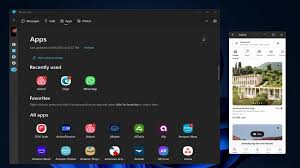Exploring Top App Development Software for PC: Tools to Boost Your Development Process
The Best App Development Software for PC
Developing applications for various platforms has become increasingly popular in today’s digital age. Whether you are a seasoned developer or a beginner looking to create your first app, having the right software tools is essential. When it comes to app development for PC, there are several powerful options available that can streamline the development process and help you bring your ideas to life.
Microsoft Visual Studio
Microsoft Visual Studio is a comprehensive integrated development environment (IDE) that supports multiple programming languages such as C#, C++, and Visual Basic. It offers a wide range of tools and features for building Windows, Android, and iOS applications. With its intuitive interface and robust debugging capabilities, Visual Studio is a top choice for many developers.
JetBrains IntelliJ IDEA
IntelliJ IDEA is a popular Java IDE that provides advanced coding assistance and productivity tools for developing Java applications. It offers support for other languages like Kotlin, Groovy, and Scala as well. IntelliJ IDEA’s smart code completion, refactoring tools, and built-in version control make it an excellent choice for Java developers working on PC.
Xamarin
Xamarin is a cross-platform development tool that allows developers to create native mobile apps using C# and .NET. With Xamarin, you can build apps for Android, iOS, and Windows platforms while sharing code across them. Its integration with Visual Studio makes it easy to develop, test, and deploy mobile applications efficiently.
Adobe Dreamweaver
Dreamweaver is a versatile web development tool that supports HTML, CSS, JavaScript, and other web technologies. While primarily known for web design, Dreamweaver can also be used to develop web-based applications for PCs. Its visual editor and code suggestions make it ideal for front-end developers looking to create interactive user interfaces.
These are just a few examples of the many app development software options available for PC users. Whether you are building desktop applications or mobile apps, choosing the right tools can significantly impact your development workflow and overall success.
Top 9 Benefits of App Development Software for PC: Versatility, Efficiency, and Community Support
- 1. Versatile tools for developing applications across multiple platforms.
- 2. Robust debugging capabilities to identify and fix errors efficiently.
- 3. Integration with version control systems for better code management.
- 4. Advanced coding assistance to improve productivity and code quality.
- 5. Support for various programming languages, catering to diverse developer needs.
- 6. Visual editors that simplify the design and layout of user interfaces.
- 7. Cross-platform development options for building apps compatible with different operating systems.
- 8. Regular updates and enhancements to stay current with industry trends.
- 9. Community support and resources for troubleshooting and knowledge sharing.
Challenges of App Development Software: Navigating Complexity, Resource Demands, and High Costs
1. Versatile tools for developing applications across multiple platforms.
App development software for PC offers versatile tools that empower developers to create applications across multiple platforms effortlessly. Whether targeting Windows, Android, iOS, or web-based applications, these tools provide a unified environment where developers can write code once and deploy it across various platforms with ease. This versatility not only saves time and effort but also ensures consistency in the user experience across different devices, making it a valuable asset for developers aiming to reach a broader audience with their applications.
2. Robust debugging capabilities to identify and fix errors efficiently.
Robust debugging capabilities in app development software for PC play a crucial role in identifying and fixing errors efficiently. With advanced debugging tools, developers can quickly pinpoint issues in their code, trace the root cause of bugs, and implement effective solutions. This not only saves time during the development process but also ensures that the final product is stable and free of critical errors. By leveraging robust debugging features, developers can streamline their workflow and deliver high-quality applications that meet user expectations.
3. Integration with version control systems for better code management.
Integration with version control systems is a significant advantage of app development software for PC. By seamlessly connecting with version control systems like Git or SVN, developers can effectively manage and track changes to their codebase. This feature enables team collaboration, ensures code consistency, and simplifies the process of merging code from multiple contributors. With version control integration, developers can easily revert to previous versions, identify bugs more efficiently, and maintain a well-organized and structured development environment.
4. Advanced coding assistance to improve productivity and code quality.
One significant advantage of app development software for PC is its advanced coding assistance, which greatly enhances productivity and code quality. These tools provide developers with intelligent features such as code completion, syntax highlighting, and error checking, helping them write cleaner and more efficient code. By offering suggestions and automated refactoring options, these software solutions enable developers to work faster, reduce errors, and maintain higher standards of code quality throughout the development process.
5. Support for various programming languages, catering to diverse developer needs.
One significant advantage of app development software for PC is its support for various programming languages, catering to diverse developer needs. This feature allows developers to work in their preferred language, whether it’s Java, C#, Python, or others, making the software versatile and accommodating for a wide range of projects. By offering support for multiple programming languages, developers can choose the most suitable language for their specific requirements, enhancing flexibility and enabling them to create innovative and efficient applications tailored to their expertise and preferences.
6. Visual editors that simplify the design and layout of user interfaces.
Visual editors that simplify the design and layout of user interfaces are a significant pro of app development software for PC. These tools provide developers with a user-friendly interface to visually create and customize the look and feel of their applications without needing to write extensive code manually. By offering drag-and-drop functionality, real-time previews, and access to a library of pre-designed elements, visual editors streamline the UI/UX design process and empower developers to efficiently create visually appealing and intuitive user interfaces for their apps.
7. Cross-platform development options for building apps compatible with different operating systems.
Cross-platform development options for building apps on PC offer the significant advantage of creating applications that are compatible with multiple operating systems. This versatility allows developers to write code once and deploy it across various platforms, such as Windows, macOS, and Linux, saving time and resources. By leveraging cross-platform development tools, developers can reach a broader audience with their applications while maintaining consistency in functionality and user experience across different devices and operating systems.
8. Regular updates and enhancements to stay current with industry trends.
One significant advantage of app development software for PC is the regular updates and enhancements it receives to stay current with industry trends. By consistently updating the software, developers can access new features, improvements, and security patches that align with the latest technological advancements. This ensures that developers have access to cutting-edge tools and capabilities, allowing them to create high-quality applications that meet the evolving needs and expectations of users in today’s fast-paced digital landscape.
9. Community support and resources for troubleshooting and knowledge sharing.
One significant advantage of app development software for PC is the strong community support and abundance of resources available for troubleshooting and knowledge sharing. Developers can benefit from online forums, user communities, tutorials, and documentation provided by the software vendors and fellow developers. This robust support network not only helps in resolving technical issues efficiently but also facilitates continuous learning and collaboration within the app development community. By tapping into these resources, developers can enhance their skills, stay updated on industry trends, and overcome challenges more effectively during the software development process.
Steep Learning Curve
Some app development software for PC can present a significant challenge due to their steep learning curve, which can be particularly daunting for beginners or individuals transitioning from other platforms. Navigating complex tools and understanding intricate features may require extra time and effort to master, potentially slowing down the development process and causing frustration for users who are not yet familiar with the software. However, with dedication and practice, overcoming this obstacle can lead to valuable skills and expertise in app development.
Resource Intensive
Certain app development tools for PC can be resource-intensive, posing a con for developers. These tools may demand substantial system resources, potentially causing slowdowns or performance issues on the PC. When software consumes a large amount of processing power or memory, it can hinder the overall efficiency of the development process and impact the user experience. Developers need to consider the hardware requirements of these tools to ensure smooth operation and optimal performance while creating applications.
Costly Licenses
High-quality app development software for PC can be hindered by the con of costly licenses. Many top-tier development tools require significant financial investment in the form of licenses and subscriptions, which can be prohibitive for individual developers or small businesses operating on a tight budget. The high price tag associated with these licenses may limit access to advanced features and tools, posing a challenge for those looking to create professional-grade applications without breaking the bank.




